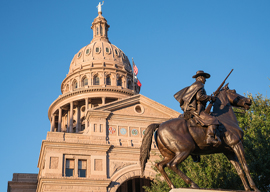
July 31, 2018

Austin, Texas State Capital
Source: Bigstock
On July 19, the Knesset voted to change the nation’s Basic Law.
Israel was declared to be, now and forever, the nation-state and national home of the Jewish people. Hebrew is to be the state language.
Angry reactions, not only among Israeli Arabs and Jews, came swift.
Allan Brownfeld of the American Council for Judaism calls the law a “retreat from democracy” as it restricts the right of self-determination, once envisioned to include all within Israel’s borders, to the Jewish people. Inequality is enshrined.
And Israel, says Brownfeld, is not the nation-state of American Jews.
What makes this clash of significance is that it is another battle in the clash that might fairly be called the issue of our age.
The struggle is between the claims of tribe, ethnicity, peoples and nations, against the commands of liberal democracy.
In Europe, the Polish people seek to preserve the historic and ethnic character of their country with reforms that the EU claims violate Poland’s commitment to democracy.
If Warsaw persists, warns the EU, the Poles will be punished. But which comes first: Poland, or its political system, if the two are in conflict?
Other nations are ignoring the open-borders requirements of the EU’s Schengen Agreement, as they attempt to block migrants from Africa and the Middle East.
They want to remain who they are, open borders be damned.
Britain is negotiating an exit from the EU because the English voted for independence from that transitional institution whose orders they saw as imperiling their sovereignty and altering their identity.
When Ukraine, in the early 1990s, was considering secession from Russia, Bush I warned Kiev against such “suicidal nationalism.”
Ukraine ignored President Bush. Today, new questions have arisen.
If Ukrainians had a right to secede from Russia and create a nation-state to preserve their national identity, do not the Russians in Crimea and the Donbass have the same right—to secede from Ukraine and rejoin their kinsmen in Russia?
As Georgia seceded from Russia at the same time, why do not the people of South Ossetia have the same right to secede from Georgia?
Who are we Americans, 5,000 miles away, to tell tribes, peoples and embryonic nations of Europe whether they may form new states to reflect and preserve their national identity?
Nor are these minor matters.
At Paris in 1919, Sudeten Germans and Danzig Germans were, against their will, put under Czech and Polish rule. British and French resistance to permitting these peoples to secede and rejoin their kinfolk in 1938 and 1939 set the stage for the greatest war in history.
Here in America, we, too, appear to be in an endless quarrel about who we are.
Is America a different kind of nation, a propositional nation, an ideological nation, defined by a common consent to the ideas and ideals of our iconic documents like the Declaration of Independence and Gettysburg Address?
Or are we like other nations, a unique people with our own history, heroes, holidays, religion, language, literature, art, music, customs and culture, recognizable all over the world as “the Americans”?
Since 2001, those who have argued that we Americans were given, at the birth of the republic, a providential mission to democratize mankind, have suffered an unbroken series of setbacks.